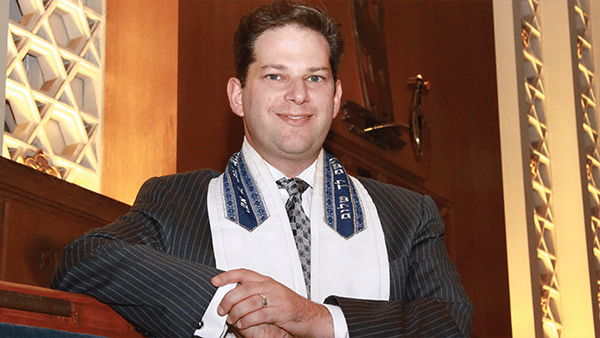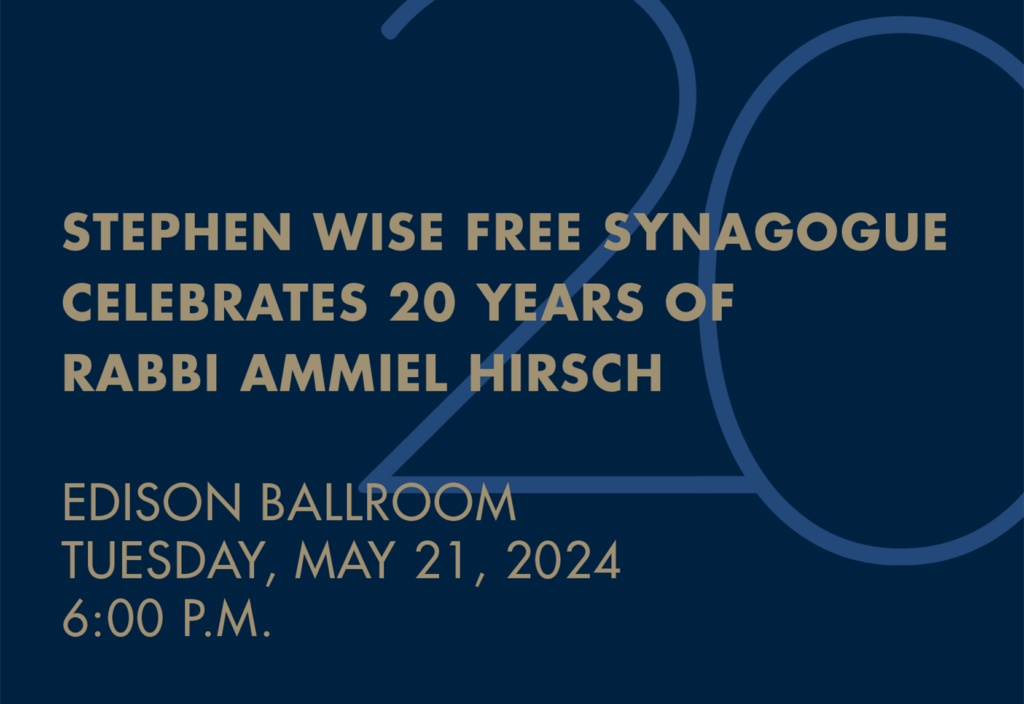
The code of Jewish law asks this question: If a community only has the resources for a cantor or a rabbi, which should they select? The answer, says Rabbi Ammiel Hirsch, senior rabbi at Stephen Wise Free Synagogue, is that the cantor is more important because only the chazzan can open up the gates of heaven for prayer.
So it was with the highest criteria that Rabbi Hirsch and lay leaders of the congregation evaluated potential cantors soon after Rabbi Hirsch was installed as senior rabbi in 2004. Still, when Cantor Daniel Singer, a booming bass-baritone and recent graduate of the Hebrew Union College-Jewish Institute of Religion’s Debbie Friedman School of Sacred Music, presented himself for the position, Rabbi Hirsch was awed. “Of all the cantors I met, he was the best and most talented. From listening to him and peering into his Jewish soul — his neshema we say in Hebrew — I knew he would open the gates of heaven for our people.”
Cantor Singer was hired, and in partnership with Rabbi Hirsch, set out to transform what was a small, struggling synagogue into the vibrant congregation it has become 10 years later.
Before the gates of heaven could be opened by Stephen Wise Free Synagogue, people would need a place to sit. The sanctuary’s original pews were falling apart — weekly donations went to various repairs. “We were at a very low ebb in our congregational life, with maybe 15 people showing up at Friday night services,” recalls former synagogue president Stephan Lynn.
Cantor Singer was attracted to the challenge — part of what led him to be a cantor was his desire to have an impact on his community. When he was finishing a master’s in voice performance at the University of Michigan in Ann Arbor, his father was diagnosed with cancer. Singer found himself reflecting deeply on his father’s career as a librarian in Superior, Wisconsin, where he was a fixture in their community. “My dad’s illness forced me to ask: What would be my legacy?”
Although his father was observant and his mother was Israeli, Cantor Singer did not grow up as part of a synagogue community. “I realized that it would be amazing to use my musical gifts as a cantor to help build a Jewish community,” recalls Cantor Singer. At age 23, two weeks after his father passed away, Cantor Singer had a bar mitzvah.
The pews were not the only antiquated aspect of Stephen Wise; the synagogue’s approach to music was also out of date. An electric piano with a noticeable delay simulated the sound of a grand piano, and an organist and small chorus of congregants accompanied services.
Cantor Singer decided they needed a real piano. “The best piano,” Rabbi Hirsch told Cantor Singer, even though they had no budget for it. To Cantor Singer, that meant a Bösendorfer, the famed Austrian brand.
The timing was fortuitous. In fierce competition with Steinway, which had a stranglehold on most New York City venues, Bösendorfer was searching for places in the city to feature its pianos. “The owner of the New York showroom happened to be tuning a piano near Lincoln Center,” Cantor Singer recalls. “When I told him our location, he said he would be over in five minutes. Upon testing the acoustics, he said that our sanctuary would be the perfect place to feature their largest piano, the Imperial.”
After Bösendorfer secured two large donations and Cantor Singer solicited his network for the remaining balance, the deal was done. News of the renowned piano attracted the attention of local orchestras, choruses, and other ensembles that would ultimately rent the sanctuary for rehearsals. In the summer of 2007, just before the sanctuary was renovated, one of the last Bösendorfer pianos that was handcrafted in Austria was installed at Stephen Wise Free Synagogue.
If You Build It, They Will Come
The transformation happened almost overnight. Rabbi Hirsch and Cantor Singer made worship the synagogue’s life force. “Even though avodah
is one of the pillars of Judaism, it’s often peripheral,” says Cantor Singer. “We wanted to put worship at the center of the synagogue experience in a way that was meaningful to Jews of all backgrounds.”
Cantor Singer transitioned the synagogue’s organist of more than 40 years from Shabbat services to a sacred music series that featured the organ and classical Reform music on Sundays. He reinvented the volunteer choir as a Musical Mitzvah group that travelled to local hospitals and nursing homes, building upon the social service mission of the synagogue’s founder, Rabbi Stephen Wise. “Instead of singing for each other, we bring joy to people beyond our walls,” Cantor Singer says.
Under Cantor Singer’s leadership, Stephen Wise was the first Reform synagogue in New York City to enjoy the sounds of a full band at Shabbat services every week — percussion, violin, flute, clarinet, bass, and electric guitar. The services also feature more Hebrew and traditional liturgy than any other Reform synagogue. “We built a service with the intention of attracting worshippers on a very wide spectrum — from secular, Reform, halachic, and Israeli backgrounds, with an emphasis on Hebrew,” says Cantor Singer.
To make Hebrew prayers accessible and participatory, Cantor Singer composed his own versions of most of the standard prayers, including Shir Chadash (“A New Song”) and Kol Adonai (“The Voice of God”), with memorable tunes and repeating patterns so that non-Hebrew speakers could easily learn them. “Dan created a style that is accessible to modern Jews but at the same time is rooted musically and spiritually in very deep Jewish sentiments that go all the way back to Sinai,” says Rabbi Hirsch. “People started flowing in.”
L’Dor Vador
Jay O’Brien remembers spotting a ukulele in Cantor Singer’s office soon after he started working at Stephen Wise as a cantorial intern in 2012. “Dan’s just the type to have a ton of instruments lying around his office,” says O’Brien, who now serves as cantor at Congregation Solel of Highland Park, Illinois.
Cantor Singer’s fluency with multiple instruments, including guitar and piano, inspired O’Brien to pick up ukulele and learn to lead services from the piano. Most of all, O’Brien hopes to emulate Cantor Singer’s selflessness. “It’s not so common for musicians to want to share the spotlight,” O’Brien says, “but that’s his personality. It’s very special — he really trusts and creates space for other people on the bimah, whether it’s b’nai mitzvah celebrants, congregants, or fellow clergy.”
Now a mentor to both new and experienced cantors — he is one of the youngest members nominated by his peers as an officer to the executive board of the American Conference of Cantors — Cantor Singer is adamant that cantors are “just a vessel. We need to get our egos out of the way so that people can connect to God.”
Cantor Singer also believes that cantors should aspire to be leaders of trends, using all of their skills — not just their voices — to benefit their institutions. He led the charge to develop a new website and install cameras to live-stream the synagogue’s Friday night services in 2010. He also digitized many of the teaching resources for b’nai mitzvah students, including sheet music and recordings of Haftorah and Torah portions.
In 2013, supported by a prestigious grant from the Covenant Foundation, Cantor Singer developed the synagogue’s Jewish Arts and Music Program, which encompasses arts offerings for all ages, from new music for the popular Tot Shabbat Together service to the Hanukkah Festival of Laser Lights, where colorful lasers light up the sanctuary, accompanied by Jewish music from across genres.
A Singing Community
When Cantor Singer looks out at the congregation on a typical Friday night, he sees people deep in prayer, singing. “It makes me proud,” he says. “When my colleagues visit, they are surprised to see how many people participate in our services that are entirely in Hebrew. There are moments when I can close my eyes, be quiet, and let the congregation lead the worship from the pews. That’s one of the greatest things.”
Cantor Singer feels great respect and admiration for Rabbi Hirsch, whom he considers his greatest supporter. “Our partnership and friendship runs very deep,” says Cantor Singer. “I cannot take credit for anything I’ve done here without recognizing his role in making it all possible.”
During such joyous community events as the synagogue’s adult b’nai mitzvah ceremony, when men and women become “children of the Torah” after two years of study, Cantor Singer is often overcome with emotion. “I’m so proud of the soloists who have sung with me on the bimah,” he says. He also kvells about the “singing with the stars” that comes with being a Lincoln Center congregation, where professional singers from Broadway and opera are synagogue members, singing alongside him.
Stephan Lynn, who was on the search committee that hired Singer, recalls a moment in Shir Chadash (“The Voice of God”), a mainstay of Friday night services, when Cantor Singer will pause and listen to the congregation singing around him. “Occasionally he will say, ‘The voice of God is within you,’ Lynn says. “Dan convinces us that we really have to sing out.”
Photo by Chris Herder


